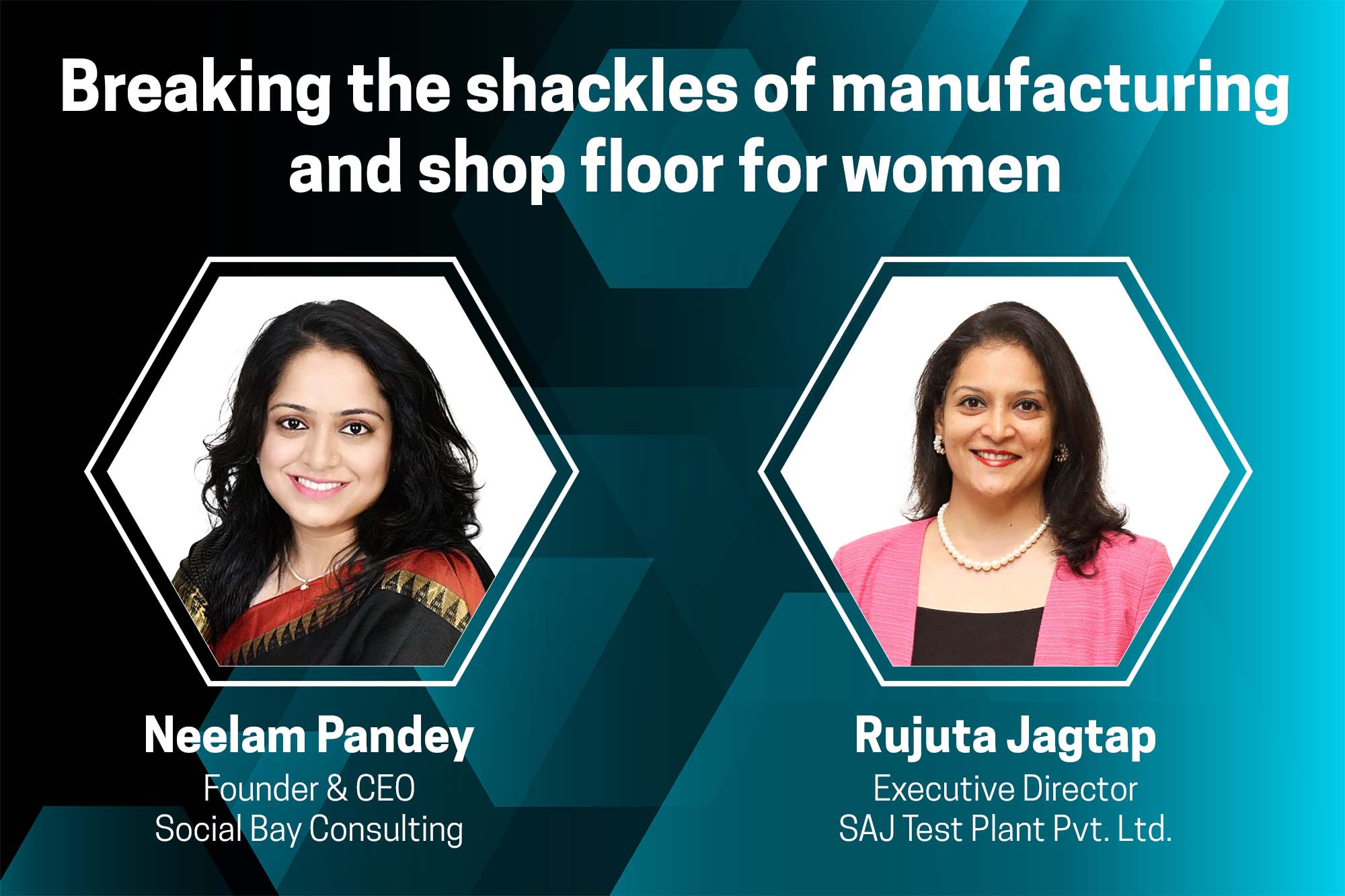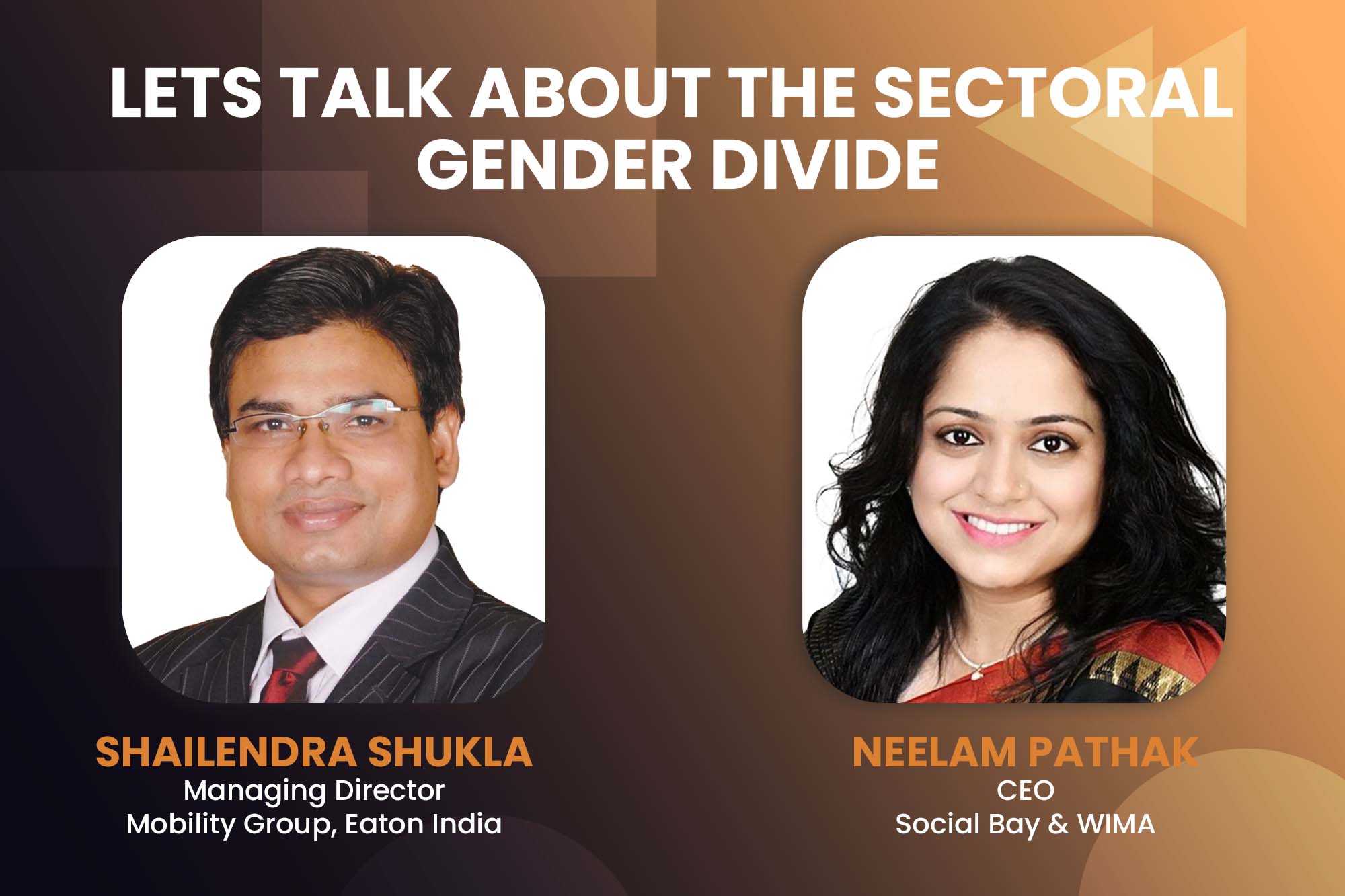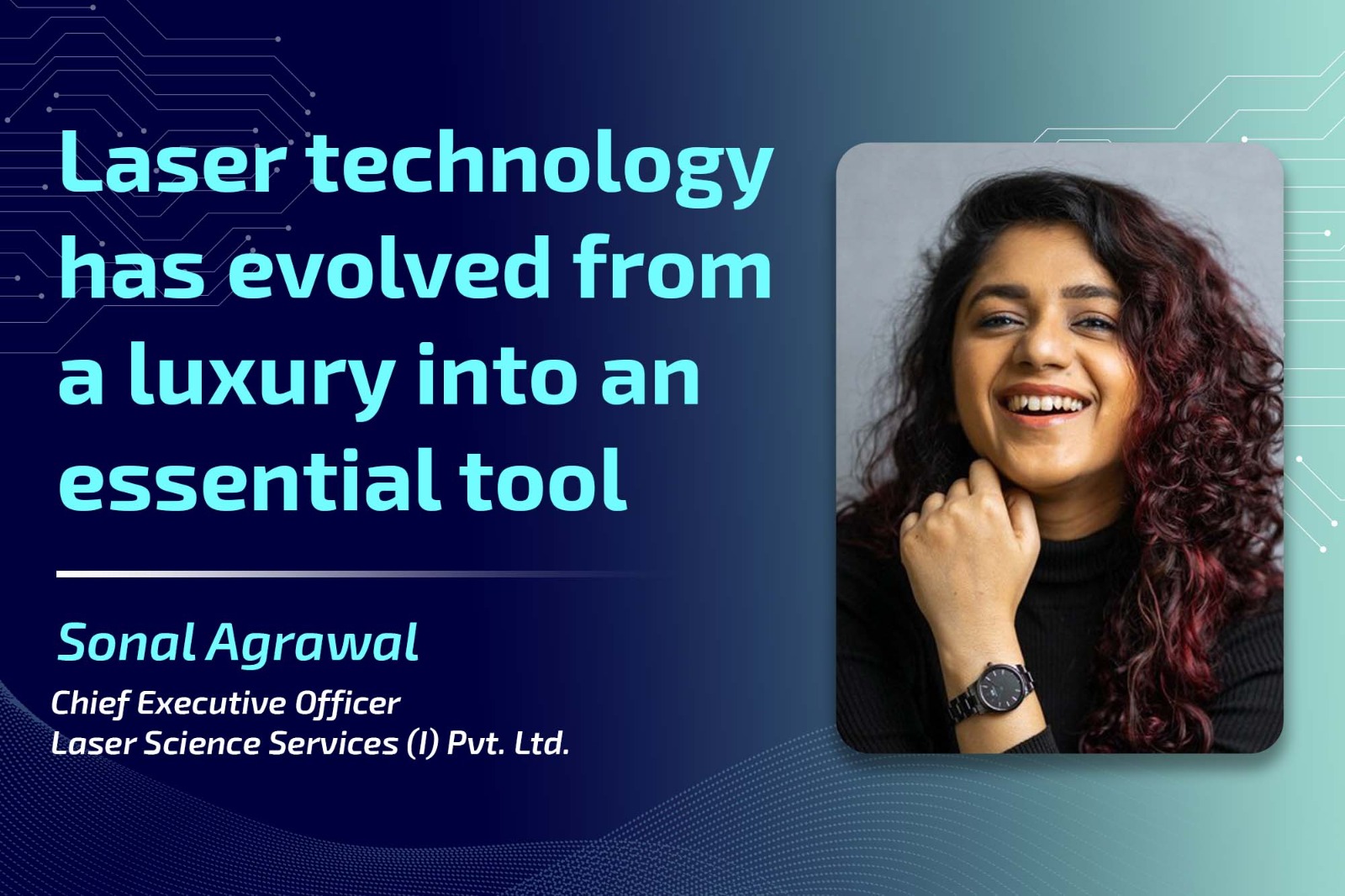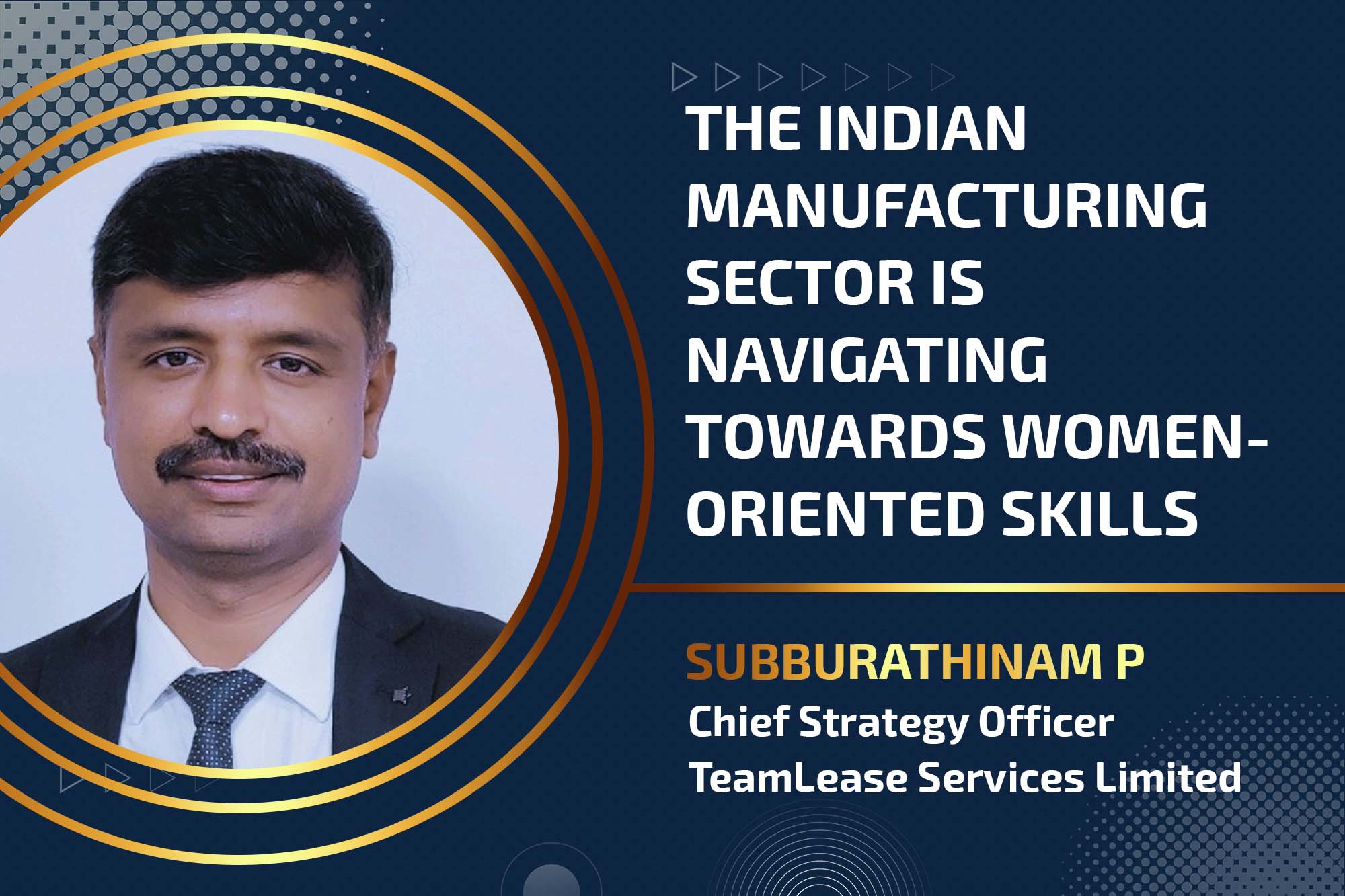Breaking the shackles of manufacturing and shop floor for women
By Staff Report December 7, 2024 6:40 pm IST
India’s female labour force participation rate (FLFPR) stood at just 37% in 2023, far below the global average of 47%. This figure starkly contrasts with the male participation rate of 76.8%, showcasing the significant gender disparity in the workforce. The COVID-19 pandemic further exposed the vulnerabilities of women in the workforce. Women were seven times more likely than men to lose their jobs and 11 times more likely to remain unemployed post-pandemic. By 2020, nearly half of the women employed in 2019 had exited the workforce entirely, revealing the fragility of their employment in times of economic shock. Female labour force participation in manufacturing and allied sectors is much worse than the above figures.
Neelam Pandey Pathak , Founder & CEO of Social Bay Consulting, engages in a conversation with Rujuta Jagtap, Executive Director at SAJ TEST PLANT PVT LTD, to share their journeys in manufacturing and encourage the new generation to explore the abundant opportunities in the industry.
Neelam: WIMA and OEM Update have launched a section on women in manufacturing, aiming to understand the challenges and barriers women leaders face and how they have achieved a longer, more fulfilling career in this sector. How have you seen the evolution of women in the manufacturing industry throughout your career, and what progress do you believe has been made in terms of diversity and inclusion?
Rujuta: I started my journey in 2002 with Tata Steel and then joined SAJ Test Plant in 2006, a transition from metallurgy to mechatronics. In my own company, as a second-generation entrepreneur, I witnessed very few women as part of the manufacturing core. The diversity wasn’t as great because fewer women were part of it back in the day, but I have seen the transition.
The shop floor is another area that is seeing change, traditionally lacking women’s presence. However, this is evolving. During a recent visit to the Tata Motors plant that manufactures the Tata Safari and Harrier, I observed that women manage the entire plant’s end-to-end operations. With over 1,500 women working across three shifts, this plant is a landmark and a benchmark example for other companies. Similarly, many companies are expanding their diversity and are looking to accommodate women on the manufacturing front.
Neelam: India has ambitious goals, especially for economic growth and workforce participation. However, there are still challenges and barriers to overcome. When you were starting, there were obstacles, and even today, similar challenges exist. From your perspective, what are some key barriers you’ve faced, and how do you think these challenges can be broken down and overcome, especially in today’s environment?
Rujuta: I’ve often observed that women are excluded from shop floors due to the misconception that they are not women-friendly. This is a myth. Modern shop floors are now designed to be accessible and inclusive for everyone. Also, women refrain from travelling to remote places due to security concerns. Many companies now offer pick-up and drop-off facilities to ensure safety. They also provide workplace daycare, easing childcare worries for women.
Women have historically faced perceptions at workplaces, such as being seen as unstable or disloyal due to marriage or relocation, or prioritising family over work. These stereotypes, like women being less mobile, emotional under pressure, or weak in handling targets, are no longer true in many cases. Companies now recognise that women are natural multitaskers, adept at balancing work and family, making them highly productive and valuable. Women also possess inherent empathy, strong interpersonal skills, and the ability to inspire passion and goal alignment.
Neelam: Individuals and organisations are responsible for addressing women’s challenges in balancing their careers and personal lives. Individuals must upskill themselves and seize opportunities to counter negative perceptions. On the other hand, organisations must adopt flexible policies, including working hours, to effectively help women manage family demands. Women’s professional growth often aligns inversely with their responsibilities, especially during mid-career phases when family demands peak. Data reveals that 20-25% of women leave jobs during this stage due to the pressures of juggling work and home. Organisations must provide critical support, mentoring, and coaching during this time to retain female talent. Crossing this phase can lead to rewarding career growth. Can you share your personal experiences and challenges related to gender diversity in the workplace, and how have you worked to address these issues in your own company?
Rujuta: When I worked at Tata Steel, I voluntarily worked long hours—18 hours a day, seven days a week—handling international markets with varying time zones and holidays. This was a personal decision, not something enforced by the company. However, it taught me valuable lessons. The company discouraged such long hours. However, I was denied the opportunity when I wanted to travel internationally for work as it was deemed unsafe. This decision didn’t sit well with me, as I managed the international market but was not granted the travel.

When I joined the family business, I consciously tried to correct this. For example, when a business trip to Europe was planned, I insisted that my female colleague, who managed international business, accompany us, even if it required an additional budget. Since 2006, our policy has been to ensure that the person handling the role gets the opportunity to travel, irrespective of gender. This practice has significantly motivated our female employees and inspired more women to join us.
Today, women are in diverse roles—on the shop floor, in electronics assembly, testing, service, marketing, sales, finance, and HR. We ensure safety, provide autonomy, and offer necessary leaves, including maternity and other types, to support our employees. These initiatives have helped us increase diversity. I believe such efforts are crucial for driving inclusivity and setting a benchmark for others.
Neelam: For those aspiring to build rewarding and fulfilling careers in sectors like manufacturing: embrace challenges and seize opportunities to grow. Gender, background, or societal expectations should never limit your aspirations. It’s about having the courage to make choices that align with your career goals. For example, when I was denied opportunities to travel for work early in my career, I ensured that as a leader, I created a culture where the person handling a role, regardless of gender, gets the recognition and opportunities they deserve. What advice do you have for women looking to build a career in the manufacturing industry?Rujuta: I encourage more women to join the manufacturing industry, as it offers immense opportunities, and there has never been a better time than now. The options range from engaging in the startup ecosystem to joining a family business and building a professional career. Women should strive to have their contributions recognised and create an impact. Equipping ourselves with the latest technology is very important to upskill ourselves.
Setting ambitious goals and working actively towards them, while having role models will fast-track careers for women. Role models serve as inspiration, and excelling in the workplace can be achieved by having mentors. Both within and outside the organisation, mentors must provide guidance, act as a sounding board, and help navigate career plateaus. Having multiple mentors brings holistic learning and aids career growth.
Networking is vital for women professionals, entrepreneurs, and those in family businesses. Joining women-oriented groups like WIMA or general forums like CCI-CII can provide support, guidance, and connections. These platforms offer opportunities for upskilling, tackling workplace challenges, and venturing into international business through delegations and collaborations. Being part of women-specific and general forums enhances interaction with diverse ecosystems, including vendors, peers, and customers.
Upskilling is crucial and should be an ongoing process with no limits to learning. Incubation is an area worth exploring, as many incubators are doing phenomenal work for the startup ecosystem. Networking, upskilling, and incubation should be actively promoted through collaboration with the government to help women access available policies and incentives. Many women are unaware of these policies.
WIMA can help raise awareness about these opportunities. Many initiatives exist, but women must be aware of them. By connecting women with these resources, WIMA can make a significant impact. Collaboration is key, and many organisations, such as SWE (Society of Women Engineers), are already contributing to women’s empowerment. We should work together to harness all these opportunities.
To know more on WIMA and how can one connect WIMA :
WIMA is a one-stop solution designed to empower women with industry-relevant upskilling, mentoring, coaching, and networking opportunities, ensuring access to the right employability across all positions and geographies ( Urban & Rural).
WIMA’s goal is to foster longer, successful careers and enable women to achieve a safer, sustainable livelihood.
For organizations, WIMA offers customized DEI (Diversity, Equity, and Inclusion) programs to enhance the retention & increase of women in the workforce, driving meaningful impact in the Manufacturing and Allied sectors
To connect to WIMA one can visit: www.socialbay.co.in/wima or write on wima.womeninmanufacturing@gmail.com or visit Social Media our linkedin page : https://www.linkedin.com/company/wima-a-platform-for-women-in-manufacturing/?viewAsMember=true
Cookie Consent
We use cookies to personalize your experience. By continuing to visit this website you agree to our Terms & Conditions, Privacy Policy and Cookie Policy.















